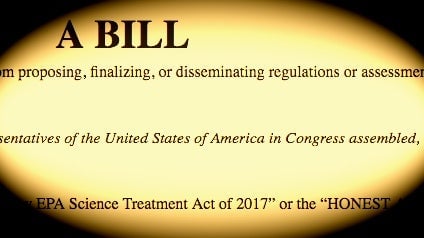The HONEST Act for science transparency has a disingenuous budget
The Honest and Open New EPA Science Treatment Act of 2017—aka the HONEST Act—is ostensibly intended to make the science that the Environmental Protection Agency relies on more transparent. But implementing the measure, passed by the US House of Representatives on March 29, could cost a small fortune and the budget is tiny.


The Honest and Open New EPA Science Treatment Act of 2017—aka the HONEST Act—is ostensibly intended to make the science that the Environmental Protection Agency relies on more transparent. But implementing the measure, passed by the US House of Representatives on March 29, could cost a small fortune and the budget is tiny.
Before HONEST got its unimpeachable name, the Congressional Budget Office estimated the costs of implementing a similar bill designed to increase science transparency, called the Secret Science Reform Act (SSRA) of 2015, would be $250 million annually for the first few years. Specifically, it would increase the cost per study for the EPA by $10,000-$30,000, and would apply to about 50,000 studies the agency relies on annually for risk assessments, regulation, guidance, standards, and other regular agency activities.
The measure was only allotted a $1 million budget; the CBO suggested in its assessment of the SSRA that the agency could adjust to limitations, writing, “EPA could instead rely on significantly fewer studies each year in support of its mission, and limit its spending on data collection and database construction activities.”
The 2017 transparency measure, HONEST, has an identically tiny budget of $1 million. This raises the question of how genuine the intention of the bill’s supporters really are, and it’s not the only one.
As Ed Yong noted in The Atlantic on March 15, some policy experts think ”the seemingly positive HONEST Act would actually sever the EPA from much of the scientific evidence that it relies upon.” But it’s difficult to argue with alleged honesty, and opposing the bill puts Democratic lawmakers in an awkward position—because language.
Republican supporters are “trying to put a positive spin on it, and for obvious reasons,” outgoing EPA administrator Gina McCarthy told The Atlantic. No one is going to say they’re not interested in pursuing sound science, but she believes the measure is ”really designed to prevent us from getting the information we need to protect public health.”
The Act states that the EPA can’t rely on studies unless their methods, data, software, and code are “publicly available online in a manner that is sufficient for independent analysis and substantial reproduction of research results.” This sounds laudable but could have dire practical consequences, according to critics in the scientific community, limiting the agency’s ability to use research premised on medical records, for example, that by law must not be made public. Although, a provision in the bill works around this by allowing for certain redactions, that makes operations more difficult and expensive.
Texas representative Lamar Smith, the Republican chairman of the House Science Committee, introduced the HONEST Act and believes it’s worth the effort. Speaking on the House floor before the vote, he explained, “We all care about the environment. But if policies are not based on legitimate science, regulations will result in economic hardship with little or no environmental benefit. In other words, the regulations would be all pain and no gain.”
His colleagues were mostly convinced. The Act passed by a vote of 228-194.